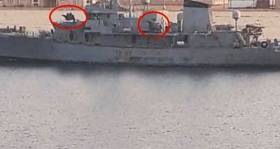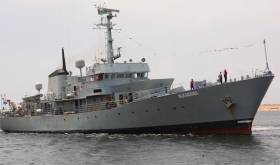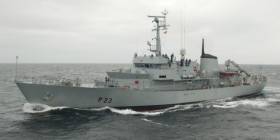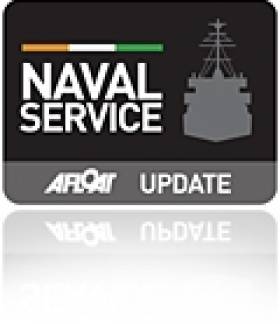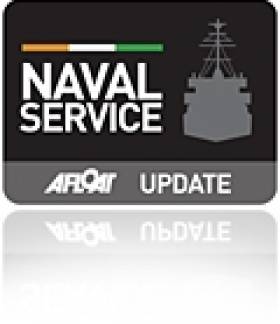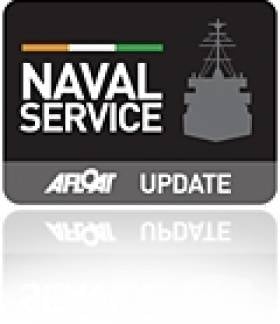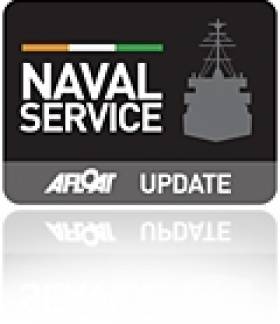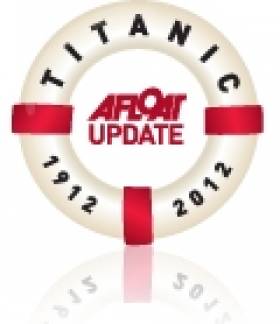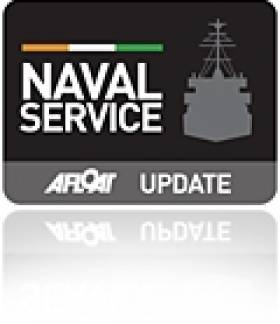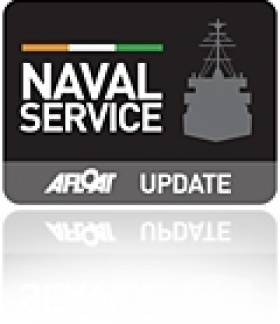Displaying items by tag: LE Aisling
Warlord in Libya Paid €1.35m for Ex-Irish Naval Vessel Sold by Ireland for €100,000
A former patrol vessel of the Irish Naval Service, LÉ Aisling, was sold to one of the participants in the civil war in Libya last year in breach of a UN arms embargo, the UN Security Council has been told.
According to The Irish Times, the embargo was breached by a company in the United Arab Emirates (UAE), about a year after the decommissioned vessel (see towage story) was sold by the State to a Dutch shipping broker according to a UN report.
The State sold the offshore patrol vessel for €110,000 to the Dutch company (which Afloat adds led to criticism of the price fetched). The Dutch company sold it a year later, for $525,000 (€473,000), to the company in the UAE, which almost immediately sold it to a company in Libya for $1.5 million (€1.3 million).
The details of what happened to the former Irish naval vessel are set out in a report just filed by the Expert Panel on Libya to the UN Security Council.
A spokeswoman for the Department of Defence said it had no “trailing obligations” in relation to the vessel, and that the resale of the ship was a matter for its purchaser.
Click here for more on this story on the final INS 'Emer' class patrol vessel which was commissioned into service in 1980.
Former LE Aisling Is Now Libyan Military Flagship
#Navy - A former Naval Service OPV is now the flagship of Libya’s military.
According to the Irish Sun, top Libyan military officer General Khalifa Haftar is now in possession of the former LÉ Aisling, which was put up for sale by its Dutch buyer last year and given a new monicker in ‘Avenhorn’, with plans for renovation into a superyacht.
Renamed again as Al-Karama, the Cork-built vessel is now the flagship of the Libyan National Army — meaning it could conceivably face its former sister ships on humanitarian missions in the Mediterranean.
Built in 1979 and sailing with the Naval Service for 36 years, the once LÉ Aisling was sold at auction over a year ago for just €110,000, and was the subject of more controversy when it returned to market within months for six times the price.
The Irish Sun has more on the story HERE.
LE Aisling For Sale By Public Auction (if not previously sold)
LE Aisling is for Sale by public auction (if not previously sold) at 12.00 noon on Thursday, 23rd March 2017 at the Carrigaline Court Hotel, Cork. The vessel is offered For Sale AS SEEN AS IS at Cork Harbour.
FOR SALE BY PUBLIC AUCTION
(NB – if not previously sold)
BY DIRECTION OF THE DEPARTMENT OF DEFENCE
LE AISLING
(Offshore Patrol Vessel)
BY DIRECTION OF THE DEPARTMENT OF DEFENCE
Built: Verolme, Cork, 1980
LOA: 65.2 ms Beam: 10.5 ms Draft: 4.4 ms Speed: 17 knots
Displacement: 1,025 Deadweight: 370.92
Engines: 2 Pielstick 6 cylinder Diesel engines - driving a single propeller.
224KW Bowthruster. Accommodation for 44 persons.
Auction: 12.00 noon on Thursday, 23rd March 2017
At the Carrigaline Court Hotel, Cork.
The vessel is offered For Sale AS SEEN AS IS at Cork Harbour.
Further Details, Photographs & Conditions Of Sale from:
DOMINIC J. DALY, FRICS, AUCTIONEER
PEMBROKE HOUSE, PEMBROKE STREET, CORK, IRELAND.
Tel: (353) 21 4277399 or mobile: (353) 87 2550486
Email: [email protected]
Navy Detain Irish Fishing Vessel off Blasket Islands
#FISHERY DETENTION - Naval Service OPV L.É. Aisling (P23) detained an Irish registered fishing vessel approximately 100 nautical miles west of the Blasket Islands, Co Kerry, yesterday afternoon.
The detention was in relation to alleged breaches of fishing regulations and recording of catch. According to the Naval Service, the detained vessel was under escort by the L.É. Aisling to Castletownbere and was expected to arrive this morning and then handed over to the Gardaí.
Earlier this month the Naval Service detained a French registered vessel, 170 nautical miles west of Castletownbere. The navy has detained 17 vessels in total so far in 2012.
Fishing Vessel Detained off Ballycotton
#FISHERY DETENTION – The Naval Service coastal patrol vessel (CPV) L.É. Ciara detained an Irish registered fishing vessel some 30 nautical miles south of Ballycotton Co. Cork. The detention which took place around midnight on Wednesday was for an alleged breach of technical fishing regulations.
The trawler was escorted by the L.É. Ciara (P42) to Cobh where it arrived on the Thursday and was handed over to the Gardaí.
In late July the L.É. Aisling (P23) detained an Irish registered vessel in waters approximately 125 nautical miles off Loop Head, Co. Clare. To date the Naval Service have carried out 946 boardings, issued 38 warnings and detained 12 vessels so far in 2012.
Fishery Detentions off Clare Coast
#FISHERY DETENTIONS – Yesterday the Naval Service OPV L.E. Aisling (P23) detained an Irish registered vessel approximately 125 nautical miles off the coast of Loop Head, Co. Clare. The detention was in relation to an alleged breach of technical fishing regulations.
The vessel was to be escorted by the OPV to arrive in Castletownbere this morning and then and handed over to the Gardaí.
Also earlier this month, the LPV L.E. Niamh (P52) detained another vessel on the same grounds. On that occasion the detained French registered vessel was likewise fishing in waters off Loop Head and taken under escort to the Co. Cork fishing harbour.
According to Naval Service figures, they have carried out 910 boardings, issued 38 warnings and detained 11 vessels so far this year.
Spanish Trawler Detained
#TRAWLER DETENTION - The Naval Service OPV LE Aisling (P23) detained a Spanish registered fishing vessel approximately 175 nautical miles off Mizen Head, Co. Kerry on Wednesday night.
The detention was in relation to an alleged breach of technical fishing regulations and the vessel was escorted by the patrol vessel to Castletownbere and handed over to the Gardai.
So far this year the Naval Service have carried out 498 boardings, issued 25 warnings and detained eight vessels. The total in 2011 was 1,313 boardings and eight detentions of vessels took place off the Irish coast.
Royal Navy Attend Presidential Fleet Review for Cobh Titanic 100
#COBH TITANIC 100 - Following President Michael D. Higgins visit to Cobh to commemorate the centenary call of RMS Titanic to Queenstown, the town yesterday hosted a Naval Service review that included the Royal Navy's HMS Mersey.
The President as supreme commander of the Defence Forces boarded the Naval Service 'flagship' L.E. Eithne which passed the guest-ship, a River class patrol vessel which headed a line of vessels which lay at anchor of Cobh's waterfront, they were the L.E. Aoife, L.E. Aisling and L.E. Niamh
The historic event which marked the pinnacle of the Titanic 100 Cobh centenary week will continue as part of a year-round programme of events. For information visit www.titanic100.ie. On the homepage the L.E. Niamh features again, where on this occasion marine photographer Jehan Ashmore captured the vessel underway as she powered her way at high-speed through a misty Dalkey Sound.
Among the many places throughout Cobh where thousands of tourists have flocked since the Balmoral docked on Monday to retrace the liner's maiden voyage, has been the White Star Line pier.
From this pier were the last passengers to depart Queenstown on board the tenders PS Ireland and PS America to the ill-fated Titanic that struck an ice-berg. On her Irish call 123 passengers were transferred to the Titanic which lay outside Cork Harbour, while 7 passengers disembarked from the liner and headed ashore.
What remains of the pier which is not accessible to the public and is in danger of collapsing, there has been calls to raise funds to save the structure, as previously reported.
Also in attendance during yesterday's historic proceedings, was the excursion passenger tender Spirit if the Isles which is operating on her second season since starting Cork Harbour cruises last year. They run between Cork city quays and downriver along the Lee to Cobh.
In the 1980's the tender then named Ingot ran excursions from Dun Laoghaire Harbour into Dublin Bay and likewise of L.E. Niamh, she too transited Dalkey Sound as part of her sightseeing tours.
- RMS Titanic
- White Star Line
- Cobh Cruise Callers
- Cobh, Cork Harbour
- Cruiseships
- Balmoral
- FredOlsen Cruise Lines
- Titanic Memorial Cruise
- naval service
- LEEithne
- Royal Navy
- HMS Mersey
- President Michael D Higgins
- Queenstown,Ireland
- PS Ireland
- PS America
- Spirit of the Isles
- Cork Harbour Cruises
- Cork Harbour News
- Dalkey Sound
- LE Niamh
- LE Aoife
- LE Aisling
- Cork Harbour
- River Class Patrol vessels
- River Lee
- Irish marine photographers
Navy Detain UK Registered Trawler
#NAVAL SERVICE – The LÉ Aisling (P23) detained a British registered fishing vessel approximately 180 nautical miles west of the Skelligs last night. The detention was in relation to an alleged breach of fishing regulations.
According to the Naval Service the vessel was expected to arrive under escort to Castletownbere this morning and handed over to the Gardaí.
This was the first detention of 2012 and so far there have also been 51 boardings this year. In 2011 the Naval Service carried out 1,313 boardings and 8 detentions of vessels.
LE Ciara Returns to Sea after Hull Repairs
#NAVAL SERVICE- The Naval Service patrol ship LE Ciara (P42) has been cleared to return to sea, following repairs to a hole in its hull, the Irish Times reports.
The high-speed coastal patrol vessel (CPV) is the latest in a series of vessels in the fleet which have required substantial repair due to a combination of age and rough Atlantic conditions.
The oldest ships of the eight-strong fleet, the sisters LE Emer , Aoife and Aisling , have all suffered plate erosion due mainly to age. The service is due to received two new ships at €50 million each, which will be commissioned in 2014 and 2015, under a deal with British shipbuilder Babcock Marine.




























